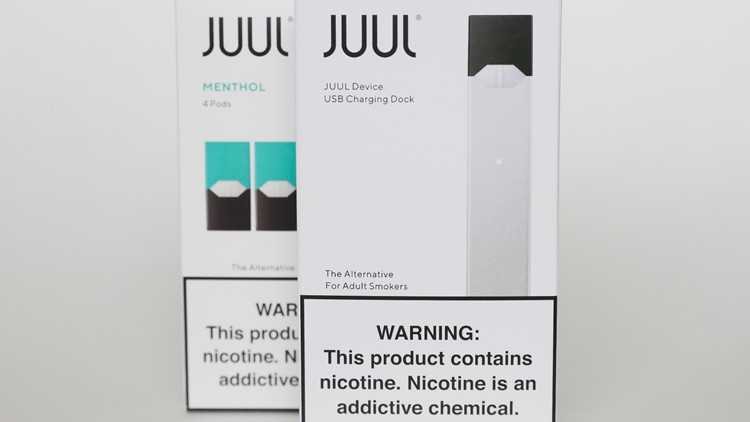HARTFORD, Conn. — Electronic cigarette maker Juul Labs will pay nearly $440 million to settle a two-year investigation by more than 30 states into the marketing of its high-nicotine vaping products, which have long been blamed for sparking a national surge in teen vaping.
Connecticut Attorney General William Tong announced the deal Tuesday on behalf of the states plus Puerto Rico, which joined together in 2020 to probe Juul's early promotions and claims about the safety and benefits of its technology as a smoking alternative.
The settlement resolves one of the biggest legal threats facing the beleaguered company, which still faces nine separate lawsuits from other states. Additionally, Juul faces hundreds of personal suits brought on behalf of teenagers and others who say they became addicted to the company's vaping products.
The state investigation found that Juul marketed its e-cigarettes to underage teens with launch parties, product giveaways and ads and social media posts using youthful models, according to a statement.
“Through this settlement, we have secured hundreds of millions of dollars to help reduce nicotine use and forced Juul to accept a series of strict injunctive terms to end youth marketing and crack down on underage sales,” Tong said in a press release.
The $438.5 million will be paid out over a period of six to 10 years. Tong said Connecticut's payment of at least $16 million will go toward vaping prevention and education efforts. Juul previously settled lawsuits in Arizona, Louisiana, North Carolina and Washington.
Most of the limits imposed by Tuesday's settlement won't affect Juul's practices, which halted use of parties, giveaways and other promotions after coming under scrutiny several several years ago.
Teen use of e-cigarettes skyrocketed after Juul’s launch in 2015, leading the U.S. Food and Drug Administration to declare an “epidemic” of underage vaping among teenagers. Health experts said the unprecedented increase risked hooking a generation of young people on nicotine.
But since 2019 Juul has mostly been in retreat, dropping all U.S. advertising and pulling its fruit and candy flavors from store shelves.
The biggest blow came earlier this summer when the FDA moved to ban all Juul e-cigarettes from the market. Juul challenged that ruling in court, and the FDA has since reopened its scientific review of the company's technology.
The FDA review is part of a sweeping effort by regulators to bring scrutiny to the multibillion-dollar vaping industry after years of regulatory delays. The agency has authorized a handful of e-cigarettes for adult smokers looking for a less harmful alternative.
While Juul's early marketing focused on young, urban consumers, the company has since shifted to pitching its product as an alternative nicotine source for older smokers.
“We remain focused on our future as we fulfill our mission to transition adult smokers away from cigarettes - the number one cause of preventable death - while combating underage use,” the company said in a statement.
Juul has agreed to refrain from a host of marketing practices as part of the settlement. They include not using cartoons, paying social media influencers, depicting people under 35, advertising on billboards and public transportation and placing ads in any outlets unless 85% of their audience are adults.
The deal also includes restrictions on where Juul products may be placed in stores, age verification on all sales and limits to online and retail sales.
Juul initially sold its high-nicotine pods in flavors like mango, mint and creme. The products became a scourge in U.S. high schools, with students vaping in bathrooms and hallways between classes.
But recent federal survey data shows that teens have been shifting away from the company. Most teens now prefer disposable e-cigarettes, some of which continue to be sold in sweet, fruity flavors.
Overall, the survey showed a drop of nearly 40% in the teen vaping rate as many kids were forced to learn from home during the pandemic. Still, federal officials cautioned about interpreting the results given they were collected online for the first time, instead of in classrooms.
Tong said the states participating in the agreement were Alabama, Arkansas, Connecticut, Delaware, Georgia, Hawaii, Idaho, Indiana, Kansas, Kentucky, Maryland, Maine, Mississippi, Montana, North Dakota, Nebraska, New Hampshire, New Jersey, Nevada, Ohio, Oklahoma, Oregon, Rhode Island, South Carolina, South Dakota, Tennessee, Texas, Utah, Virginia, Vermont, Wisconsin and Wyoming.



